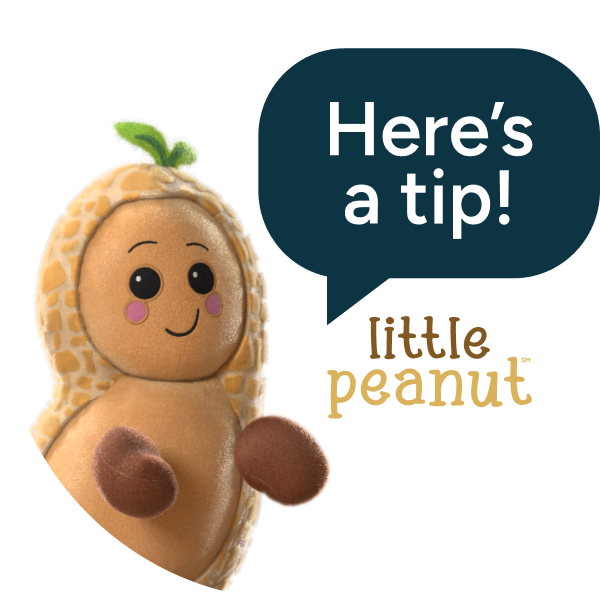Prevent Peanut Allergies
The evidence is clear: early peanut introduction can prevent up to 86% of peanut allergies from developing. In human terms, that means tens of thousands of children born each year – and their parents – can live every day free from worry about every bite of food.
Of course, prevention requires action. Fortunately, science-based guidelines, expert-developed tips and a variety of infant-friendly infant foods and recipes are available and can help.
Whether you are a parent of a newborn, healthcare provider or other champion for infant health and nutrition you have a role to play. To learn more, start here.

I'm thrilled you are joining me on the journey to prevent peanut allergies.
Look out for this cute icon with my face on it throughout this site and you'll find my special tips.
Frequently Asked Questions
What Do The Guidelines For Peanut Allergy Prevention Say?
The National Institute of Allergy and Infectious Diseases (NIAID) and the Dietary Guidelines for Americans recommend introducing baby-friendly peanut foods to infants as early as 4-6 months of age, depending on their risk factors. Start after they have tried other solid foods and consider your family’s cultural practices. Continue feeding peanuts “early and often” — at least three times per week.
Infants with severe eczema, an egg allergy, or both are at higher risk for developing a peanut allergy. Consult your child’s healthcare provider before introducing peanuts[1]. Don’t delay, as the window for prevention is short and closes early. Most babies are not at high risk[1].
What Research Is There To Support The Recommendations?
Early introduction guidelines for peanut allergy prevention are primarily based on the LEAP, LEAP-On, and LEAP Trio studies[3][4][5]. The LEAP study demonstrated that introducing peanut products to infants at high risk for allergies significantly reduced the incidence of peanut allergy by age 5[3]. The LEAP-On study confirmed that this protection persisted even after a year of peanut avoidance[4]. The LEAP Trio study extended these findings, showing that early peanut consumption continued to provide protection into adolescence, with a 71% reduction in peanut allergy rates[3][4]. This comprehensive research underscores the long-term benefits of early allergen introduction for sustained allergy prevention[3][4].
Will These Recommendations Prevent All Babies From Developing Peanut Allergy?
No, these recommendations will not prevent all babies from developing peanut allergy. However, according to the LEAP study, parents of children at risk for peanut allergy could reduce their baby’s chance of developing a peanut allergy by up to 86 percent by feeding them small amounts of peanut foods as early as 4-6 months of age[3][4].
Do The Recommendations Apply To Other Foods?
Should I Speak To A Pediatrician Or Family Doctor Before Introducing Peanut Foods?
If your baby does not have severe eczema or egg allergy, you can introduce peanut foods into their diet when you introduce other solid foods (as long as it’s in an age-appropriate way to avoid the risk of choking)[1]. If you have concerns, or if your child has egg allergy or severe eczema, consult your pediatrician or other healthcare provider before proceeding[1].
How Much And How Often Should Peanut Foods Be Fed To The Infant?
Once peanut foods are introduced into the diet and tolerated, they should be kept in the diet on a regular basis ― 2g of peanut protein, three times per week ― to maintain a tolerance to peanut protein[1].
What Do I Do If My Baby Has A Reaction? What Do I Look For?
Allergy symptoms usually develop within minutes of eating a food but can occur up to 2 hours after ingestion[7][8][9]. Allergy signs and symptoms can be mild, such as a new rash or a few hives around the mouth[7][8]. More severe symptoms can include swelling of the lip, eyes, or face, vomiting, widespread hives on the body, breathing symptoms such as repetitive cough, wheeze, or any difficulty breathing, a change in skin color (pale, blue), or sudden tiredness/lethargy/seeming limp[7][8][9]. If there are any concerns for more severe allergy symptoms, seek immediate medical attention/call 911[7][8][9].
References
[1] Addendum Guidelines for the Prevention of Peanut Allergy in the United ...
[2] Dietary Guidelines for Americans, 2020-2025 and Online Materials
[3] New Results from LEAP-Trio Studies Unlock Additional Insights on ...
[4] Introducing peanut in infancy prevents peanut allergy into adolescence
[5] LEAP Trio | LEAP
[6] Dietary Guidelines for Americans
[7] Peanut Allergy: Symptoms, Reaction, and Treatment - WebMD
[8] Peanut allergy - Symptoms and causes - Mayo Clinic
[9] Peanut Allergy: Symptoms, Reaction, Tests & Treatment - Cleveland Clinic


